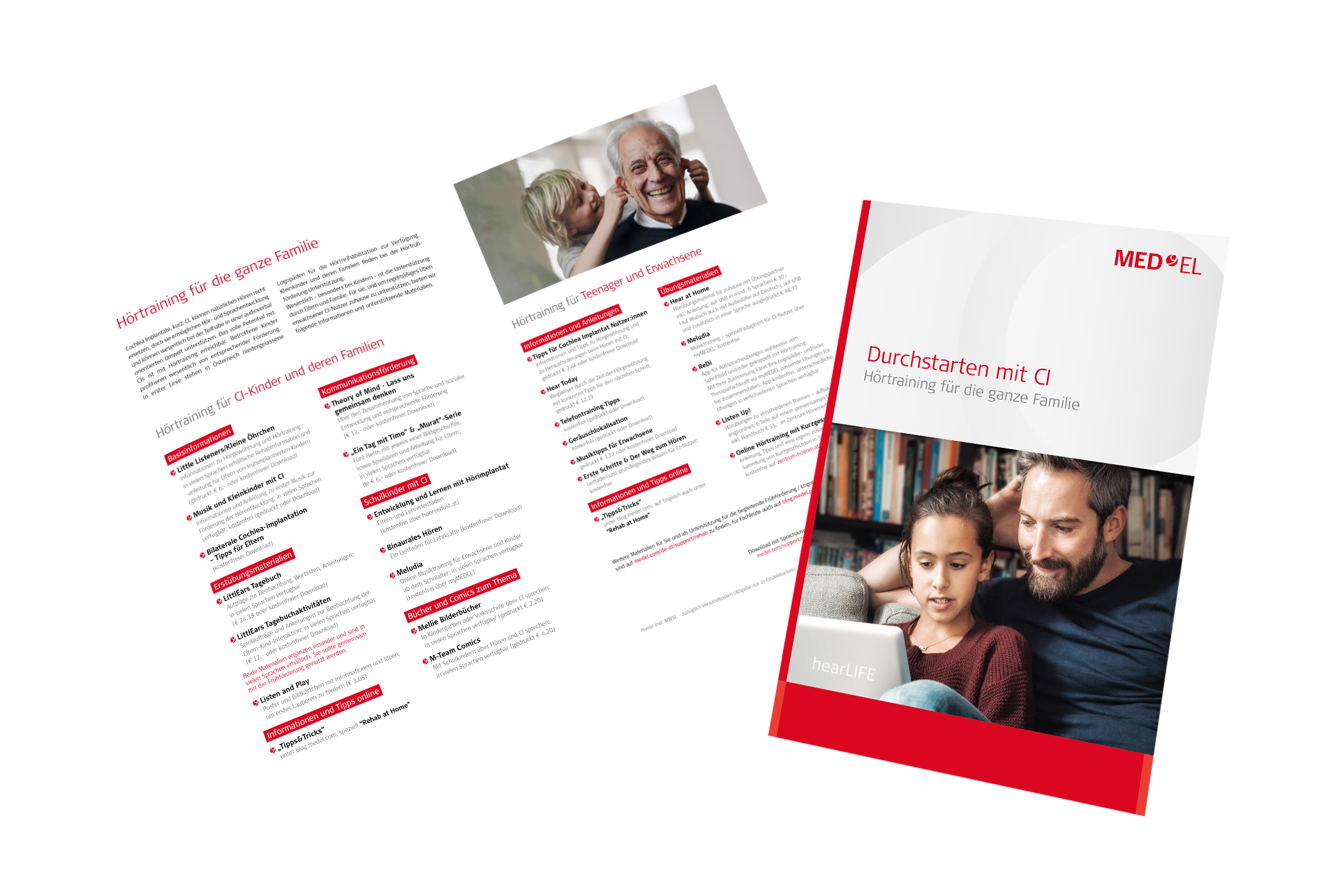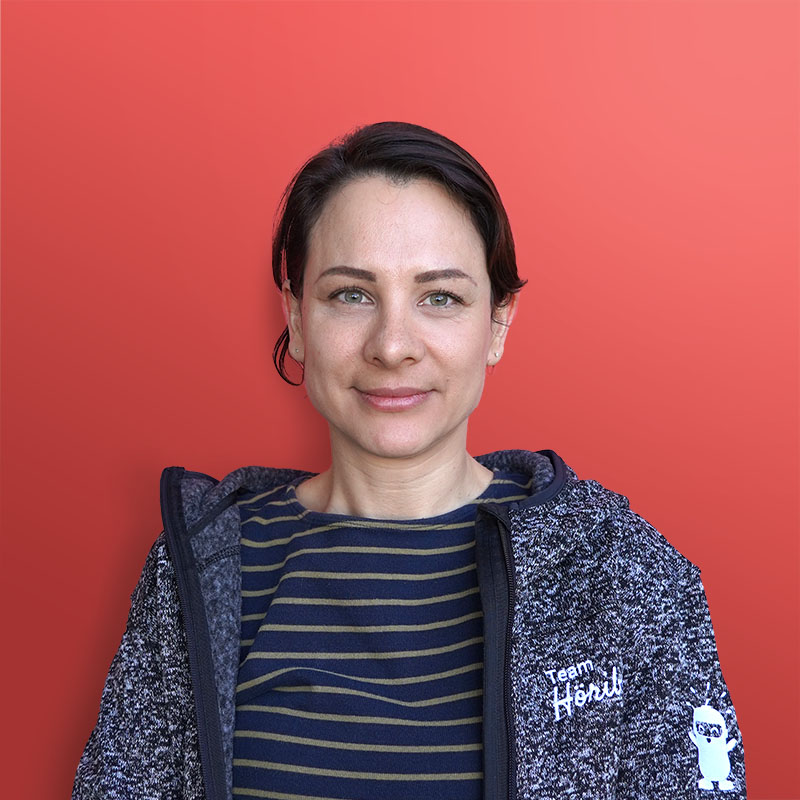Rehabilitation


Rehabilitation
Everything about rehabilitation and support for children with hearing impairments
Even if the diagnosis "My child has a hearing impairment" is difficult to grasp at first, can be upsetting and unsettling, it is important for your child's hearing success that you provide them with the best possible support.
Doctors should be the first, but not the only point of contact when it comes to hearing loss. Immediately after the diagnosis and the informative consultation with the doctor, the first steps should therefore be taken and suitable accompanying therapy should be started to support your child.
Below you will find important tips for the optimal therapeutic support for your child in the first months and years of life!
Table of contents
Initial provision with technical aids
![]() Whether a conventional hearing aid is sufficient or a cochlear implantation is ultimately on the cards, the first route will probably lead to a specialist acoustician. As CI surgery is usually performed around the first birthday, fitting a hearing aid in advance is usually advantageous, as the residual hearing that is usually present can be optimally stimulated during the months of waiting for the operation. Many specialist institutes throughout Austria offer special care for children by so-called pediatric audiologists.
Whether a conventional hearing aid is sufficient or a cochlear implantation is ultimately on the cards, the first route will probably lead to a specialist acoustician. As CI surgery is usually performed around the first birthday, fitting a hearing aid in advance is usually advantageous, as the residual hearing that is usually present can be optimally stimulated during the months of waiting for the operation. Many specialist institutes throughout Austria offer special care for children by so-called pediatric audiologists.
Rehabilitation and support options
Hearing loss disconnects - early hearing support connects
In addition to technical hearing care and therapeutic measures, comprehensive continuous support from the educational field is highly recommended. This includes the early intervention in education and speech therapy or audio education, as well as the wide range of support options available at home and in everyday life.
Early intervention offers an ideal way for babies and toddlers in particular - usually with one or both parents present - to receive playful training and support. This means that any existing developmental delays can be made up for and even compensated before any planned hearing implantation.
Here you can find valuable tips on optimal support for your child through professional care, but above all in your everyday life!
Early hearing support
"Children should receive two things from their parents - roots and wings."
Johann Wolfgang von Goethe
![]() Early audiopedagogical support and interdisciplinary cooperation enable your hearing-impaired child to participate in society. The aim of early hearing support is to develop the skills of affected children and their parents. If a child is unable to communicate with their parents, siblings or grandparents, they can feel like strangers in their own family. The strengthening of communication skills, integration of hearing and holistic developmental support are the main goals of early intervention.
Early audiopedagogical support and interdisciplinary cooperation enable your hearing-impaired child to participate in society. The aim of early hearing support is to develop the skills of affected children and their parents. If a child is unable to communicate with their parents, siblings or grandparents, they can feel like strangers in their own family. The strengthening of communication skills, integration of hearing and holistic developmental support are the main goals of early intervention.
It is essential to involve the family, as parents are the most important partners when it comes to working together with their child. In most cases, the early hearing specialists visit the families in their home environment. They also advise and support them in choosing a kindergarten and accompany them to specific appointments.
Regular meetings where parents can exchange ideas are also offered in many places; this gives children the opportunity to play in a group with other hearing-impaired children.
The early hearing support team also works closely with medical and therapy specialists and sets common goals to ensure quality assurance in early intervention and ultimately the success of your child's development.
Here you can find institutions in your federal state that offer early hearing support!
I believe that the goal of
education needs to be love.
Astrid Lindgren

You can download these instructions, tips and exercise materials here!
*Most of the materials offered on this page are available in German.
Checklist for everyday life in the family
Discover hearing
 Draw your child's attention to any sounds you hear. Try to describe them. Whether at home, in the zoo or at the playground - we are surrounded by countless noises and sounds.
Draw your child's attention to any sounds you hear. Try to describe them. Whether at home, in the zoo or at the playground - we are surrounded by countless noises and sounds.- Work a lot with music, as it conveys joy and has a positive effect on hearing as well as speech development. Depending on the age group, there are a variety of materials that additionally support the development of music perception.
- If your child repeatedly refuses to wear the audio processor, the reasons for this can be easily resolved: During fitting appointments, for example, make sure that your child finds the current setting comfortable. The magnet of the audio processor may also be too strong and create an uncomfortable pressure point. The bottom line is that a properly adjusted audio processor and the right conditions will ensure that your child recognizes the benefits of the new hearing aid.
Surrounded by sounds
 Please don't "fall silent" because you think your child can't hear you. On the contrary - talk to your hearing-impaired child, perhaps even a little more than you would if they had normal hearing.
Please don't "fall silent" because you think your child can't hear you. On the contrary - talk to your hearing-impaired child, perhaps even a little more than you would if they had normal hearing.- Don't change the naturalness of your speech - whether you whisper, speak at a normal volume or sing.
- Conversely, pay attention to all sounds and linguistic utterances that your child makes. They should understand the effect of their language as a means of communication.
- Share experiences, activities, etc. with your child verbally. Don't forget to illustrate things that your child may not have heard.
- For families with a migration background: if possible, try to offer both languages - the mother tongue and the national language. Every child, even if they need a technical hearing solution, is capable of learning several languages.
- Keep a record of your child's experiences in a diary that you can refer to at any time. With pictures, drawings and even writing, your child can show their diary to someone else and use it to recount their experiences, even if their speech may still be a little behind due to their hearing impairment. Apart from that, the diary will later be a wonderful reminder of the first years of life.
- Play role-playing games with your child! Among other things, this promotes their ability to empathize with other people. He or she plays "into the world of the other person", so to speak, and sees and feels the world with different eyes.
- Expand your child's "library" and take time to read (aloud) together. You can never have too many books in the house and picture books with age-appropriate and learning-promoting content are a must from the very beginning.
- Sing in front of your child as often as you can! And don't be too surprised if your child tries to imitate you one day. This could be one of the great moments in the early years of hearing.
Necessary checks
 Check that your child's hearing system is working properly every day, as they may not be able to alert you to a defect in time.
Check that your child's hearing system is working properly every day, as they may not be able to alert you to a defect in time.- Have your child's hearing performance checked regularly by means of a hearing test - usually at the speech therapist appointment.
- Attend regular maintenance appointments with the pediatric hearing care professional or service team of the hearing system manufacturer.
Loving attention
 Encourage your child's creativity and self-activity so that they can experience themselves better.
Encourage your child's creativity and self-activity so that they can experience themselves better.- You and your child should maintain regular contact with other families or hearing-impaired people for whom hearing loss is an issue. This will open up new doors of acceptance for you.
- Never forget to give your child loving attention, especially direct physical contact. This reassures them of your love and affection.
- Don't lose heart and try to remain patient if your child hasn't yet made the progress you desire.
- Remember: your child can do just as well as a hearing child, and sometimes even better, if you give them the chance!
- Take time for yourself regularly so that you can recharge your batteries for everyday life with your family.
- Please don't compare your child with the abilities of other hearing-impaired children of the same age. Due to the different life structures, each affected child develops in their own way and at their own pace.
- Try not to treat your child differently from hearing children. Your hearing-impaired child also needs clear rules and boundaries in order to be able to perceive their own needs appropriately and feel safe in the family environment.
- And please don't forget: you have not only taken on a difficult and demanding task, but you also have a wonderful goal ahead of you: you can accompany your child on the path to hearing and thus to a normal, independent life.
Speech therapy
"The limits of my language are the limits of my world."
Ludwig Wittgenstein
![]() Hearing and speech are closely linked in language development. Any hearing impairment greatly reduces the ability to acquire spoken language. Children with a hearing impairment should therefore also receive speech therapy in addition to good and timely hearing care in order to lose as little time as possible in acquiring spoken language.
Hearing and speech are closely linked in language development. Any hearing impairment greatly reduces the ability to acquire spoken language. Children with a hearing impairment should therefore also receive speech therapy in addition to good and timely hearing care in order to lose as little time as possible in acquiring spoken language.
The most important goal of speech therapy is to enable communication so that the child can express their wishes and needs. Therapeutic work therefore includes: Awareness training, auditory training, articulation, communication strategies, (early) written language acquisition, increased support for speech development through visual material, pedagogical advice and work with parents.
In contrast to early hearing support, which supports your child through play and has a broader spectrum that also includes motor skills and other areas of development, speech therapy prepares your child precisely for the language structures. In addition, the speech therapist is also an important pivotal point in communication with experts from other relevant specialist areas, especially in the initial phase.
In the first few months of life, the speech therapy specialist regularly checks the hearing success with the new hearing aids using special hearing tests until any necessary cochlear implantation and accompanies you as parents on this decisive path.
Inpatient rehabilitation
![]()
For CI children aged 0 to 18, there is the option of inpatient hearing rehabilitation at the kokon/Rohrbach-Berg site in Upper Austria. You can find out more about the requirements and options here!
Further rehabilitation and support options
![]() On average, one third of all hearing-impaired children have an additional handicap. If your child has multiple impairments or a partial impairment, you should definitely take advantage of further therapy measures in addition to hearing care and regular speech therapy support.
On average, one third of all hearing-impaired children have an additional handicap. If your child has multiple impairments or a partial impairment, you should definitely take advantage of further therapy measures in addition to hearing care and regular speech therapy support.
Occupational therapy, music therapy or physiotherapy - depending on the type of additional handicap - are just a few examples.
Support through psychotherapy
The diagnosis "My child has a hearing impairment" is initially a shock for most parents and means a huge adjustment. Psychotherapeutic support is sometimes a good decision so that you can find your way through the new life situation, support your child despite the grief and even draw strength from it. In Austria, several experts now offer therapy sessions who specialize in the topic of hearing impairment or have experience in dealing with it.
It is not what we experience, but how we feel,
what we experience determines our destiny.
Marie Baroness von Ebner-Eschenbach
Contacts
Personal contact with those affected
The opportunity to get in direct contact with other families and users is immeasurably important for affected parents, especially at the beginning of this special journey with their child. Here you will find personal contacts who have gladly made themselves available for our website as advisors and to share their experiences - because hearing connects!
Technical hearing care
Acoustician
There are a large number of hearing aid acousticians in Austria. Whether you choose one of the well-known chains or an individual company, it is important that you have confidence in the specialist staff there and feel that you are receiving the best possible advice.
Hearing implant manufacturer
The hearing implant manufacturer MED-EL is an Austrian family business with its headquarters in Innsbruck/Tyrol. In Vienna, there is a branch in the 9th district with the ZENTRUM HÖREN service center, which offers comprehensive advice and support to people with hearing impairments and hearing loss as well as users of hearing implant systems throughout Austria.
Rehabilitation & Therapy
Speech therapy
Whether contract, elective or private speech therapy - here you will find interesting facts about the profession as well as a search function for the speech therapist of your choice.
Other forms of therapy
There are many different forms of therapy. Here you can find an overview of the most important areas:
Here can find an overview of the wide range of exercises offered by the hearing implant manufacturer MED-EL, which you can download or purchase directly from the ZENTRUM HÖREN webshop:
Psychotherapy
Here you will find a list of experts who are familiar with the topic of hearing impairment or who offer additional support through specific language skills for people with a migration background:
Vienna:
- praxismargreiter.at
- markus-braeuer.at
- psychotherapy-zaslawski.net
- psychology-behavior-therapy.com
- psychotherapy-blachowsky.at
Salzburg:
Tyrol:
Psychotherapy on a sickness certificate:







